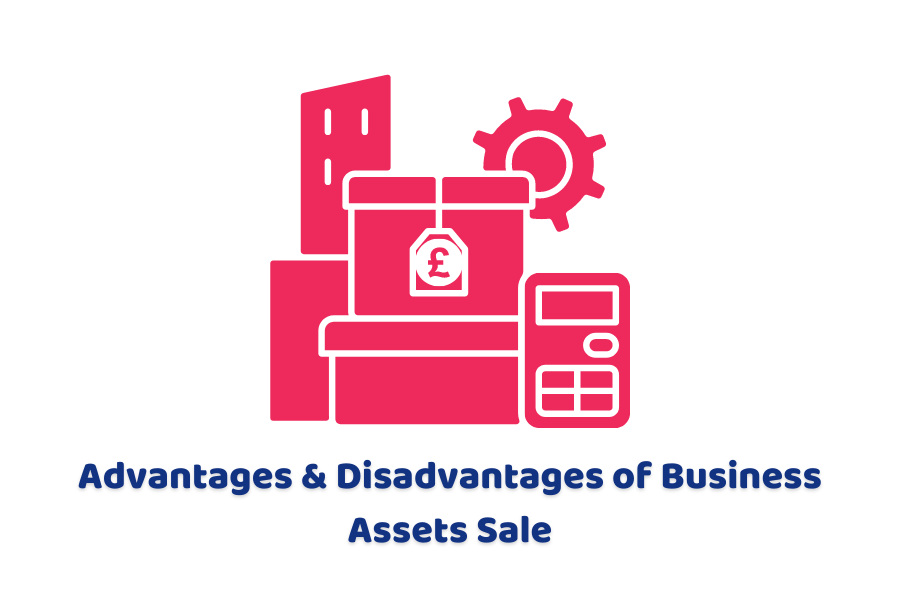Selling business assets requires intelligent and informed decision-making and that is impossible without considering the advantages and disadvantages of sale of business assets. Business assets sale is a means to acquire funds for different purposes. A business needs to sell its assets to get cash or to meet the business debt liabilities. On the other hand, the closing down of a business also leads to the sale of assets of a business. Similarly, the mergers & acquisitions happening every day also require the sale of assets to cover the liabilities of a company.
In this blog, we will walk you through the introduction of a business asset sale and why it becomes necessary to sell the assets. Moreover, we will discuss the advantages and disadvantages of a business asset, so that you can avoid losses and pitch a lucrative sale price ultimately.
Let’s get a qualified business advisor to make a profitable deal while selling your business assets. Reach out to the professional accountants at the AccountingFirms now.
What Are Business Assets?
Business assets can be categorised as tangible and intangible assets. The assets are the valuable items held by a company that ultimately increase the value of a company and profitability. The assets can appreciate or depreciate over time. While selling business assets, the depreciation of the assets is taken into account and is sold after deducting the depreciation value. On the other hand, some items appreciate over time, increasing the value of the possessions.
Tangible assets are the assets that exist physically. For example, furniture, buildings, machinery, equipment and inventories. On the contrary, Intangible assets are those assets that have no physical existence and cannot be touched. For example, goodwill, intellectual property rights and healthy customer relationships.
Why are Business Assets Important?
Business asset sale becomes necessary when a company is under debt and to offload the debts, it has to sell some of its business assets. On the other hand, when someone is planning to retire and seek to sell his business, he can sell his business assets to another entrepreneur. If someone is switching, upgrading or relocating their business, they can sell their business equipment or assets as they no longer need them. To meet the cash requirements, some business owners also have to take the decision of selling business assets.
Business assets are important for carrying out business operations and selling products or providing services. For example, a building provides a space for the workers and a piece of machinery is useful to produce goods and services. So, no business can thrive without business assets and selling business assets reduce the overall value of a business. The increase in assets indicates the good financial health of a business, more investors will be able to invest in that company and lenders will provide loans ultimately.
Advantages of selling Business Assets
Following are the advantages of selling a business asset:
Earn Higher Returns
Earning higher returns on the appreciated business assets like buildings, and precious commodities can give you handsome returns. So, you can achieve more than what you have paid for. Ultimately, you can get extra money by the sale of your business assets. While selling your asset, you must determine the right and fair market value of the assets before you dispose of them.
Pay Off Debts
Selling the business assets means you will get funds and you can pay off part of or all your debts. You can offload some of the debts and liabilities by selling business assets. If you have got your debts higher in your business and you are unable to get more debts, you can sell your business assets as a last resort. As a result, it will reduce your business assets and at the same time the business liabilities.
Disadvantages of Business Asset Sale
Nevertheless, you cannot ignore the cons of selling business assets.
The Capital Gains (Corporation) Tax
The Capital Gains Tax (CGT) is applicable when someone earns a profit after holding an asset for a particular period of time. In the United Kingdom, if you hold an asset and then sell it to another person, any profit made will result in a corporation tax in the UK. The normal rate of corporation tax is 19% while the taxable profit rate is 10%.
On the other hand, if you gifting the assets to your husband, wife, or civil partner, you don’t need to pay the corporation tax. Nevertheless, if you are an individual selling your assets, you have to pay Capital Gains Tax.
Only limited companies, clubs, cooperatives and foreign companies with a UK branch have to pay the Corporation tax.
Final Thoughts
Lastly, we can say that business assets sale requires an accurate estimation of the market value of the assets. Besides, you cannot ignore the advantages and disadvantages before you sell your assets. The tax liabilities and the tweaks to increase the valuation of your business assets is only possible when you are aware of all the pros and cons.
Therefore, a 360 degrees analysis of the sale of business assets is the only way to get the best out of a business deal. It will fetch you higher returns with lower risks and tax liabilities. I hope you have taken all the advantages and disadvantages of sale of business assets before reaching a final deal.
Are you looking for a business accountant who can help you in the valuation of your business assets? Search your accountant at the AccountingFirms with the budget of your choice.
Disclaimer: All the information provided in this article on the Advantages and Disadvantages of Sale of Business Assets, including texts and graphics, is general in nature. It does not intend to disregard any of the professional advice.

